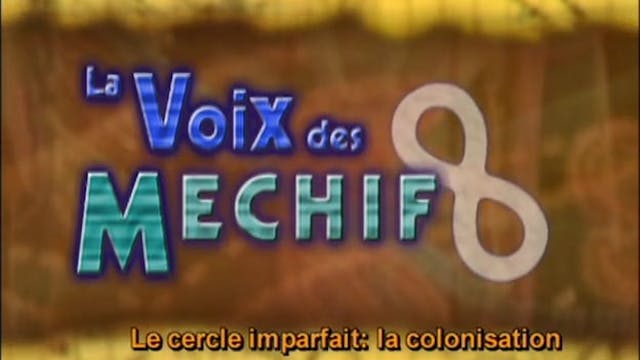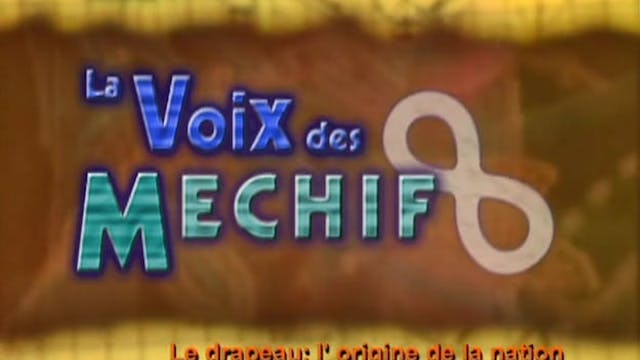La Voix des Mechif - Complete Series
(2002, 3 parts x 23 minutes)
"La Voix des Mechif" is a series of three, 23-minute documentaries on the Red River Mechif or Métis people, produced and directed by Mechif historian, educator and storyteller Dr. Raoul McKay. It reveals the origin of a distinct nation with land, laws, its own language and culture.
1. Le drapeau: l'origine de la nation (2002, 23 minutes) The Mechif ruled the plains as successful hunters, voyageurs and traders. As European settlements grew, the settlers sought to control the Mechif and force them to trade pemmican with the Hudson's Bay Company instead of its competitor, the North-West Company or the Americans to the south. This documentary traces the role of early leaders Pierre Falcon and Cuthbert Grant. It reveals the role of the Church as a partner with settlers and European governments in their efforts to assimilate and control the fiercely independent Mechif.
2. La Terre: la base de la nation Mechif (2002, 23 minutes) This second part focuses on the period of 1849 to 1885. The Mechif declared free trade in 1849, despite efforts of the settlers to control their pemmican trade. As settlers from Ontario increased in numbers, the Mechif were determined to protect their land base, essential to their established form of self-government. Negotiations with a recently formed Canadian government created The Manitoba Act of 1870. It set aside 1.4 million acres of land for the Mechif but while appearing to be benevolent, that was far from the case. The land was surveyed in odd ways and a scrip program saw speculators, including business and the Church, rush to purchase scrips from the Mechif at a fraction of their true value. Shunted off their land, this destroyed the Mechif Nation at Red River and many were forced to sleep in road allowances. Gabriel Dumont sought help from Louis Riel to protect their land in Saskatchewan; but with the help of settlers from Ontario and Québec, the Mechif were defeated in the 1885 Battle at Batoche. Riel was captured and Dumont fled to Montana. Even though the Canadian Government didn't have legal jurisdiction over the site of the battle, they acted as if they did. Instead of treating Riel as a prisoner of war, they used an obscure English 14th century statute to execute him for treason to the King. This set the tone for the Canadian Government's future treatment of First Nations with actions that included the banning of traditional languages and cultural practices, Residential Schools, and the Pass System. It also defined the future of the Canadian West, which became a multi-ethnic English speaking society instead of a French-English-Indigenous society as it remains today.
3. Le cercle imparfait: la colonisation (2002, 23 minutes) This part covers the period following the 1885 Battle at Batoche and the role of the scrips program. The Canadian Government's commissioners handing out the scrips were accompanied by speculators who preyed on the Métis people to buy the scrips for a fraction of their worth. The Métis were reduced to squatters on what had been their own land. George Fleury's ancestors had lived in Ste-Madeleine near the Manitoba-Saskatchewan border. He was born there too and recalls how they were forced to move out in 1939 when the PFRA wanted the village to be turned into a community pasture. His family returned from a day's work to find all the houses, the store and their church burned to the ground. They were left with only the clothes on their backs and forced to become transient, living on road allowances. During this period, the Métis were caught in a jurisdictional vacuum with neither federal nor provincial governments taking any responsibility for them. The Alberta Government recognized the severe hardships the Métis were facing. Knowing that the Canadian Government would do nothing to help, Alberta passed the Métis Betterment Act and gave the Métis a land base. This led to the creation of successful communities like St. Paul, where the people have a sense of destiny connected to stewardship of the land.
Directed by: Brian Rougeau
Produced by: Dr. Raoul McKay, First Voice Media
For educational licensing (DSLs) and educational DVDs visit https://movingimages.ca/
-
La Terre: la base de la nation (Land: The Base of the Nation) (E2)
Increased settler immigration in the 1860s and 70s increased pressure on the Mechif. As successful hunters, traders and businessmen, they complicated the European’s pre-Confederation plans. Under The Manitoba Act of 1870, the Canadian Government agreed to allocate 1.4 million acres to the Mechif....
-
Le cercle imparfait: le colonization (The Imperfect Circle: Colonisation) (E3)
From 1885 to the 1930s, the Mechif remained a homeless people without jurisdiction. Some moved west to Saskatchewan and Alberta. Others remained in Manitoba. Those in the village of Sainte-Madeleine, near the Saskatchewan-Manitoba border, remained there as they always had, believing they had the ...
-
Le drapeau: I' origine de la nation (The Flag: The Origin of the Mechif Nation) (E1)
The Métis flag is the oldest Indigenous flag in the North-West, dating back to 1816 and that the Mechif people were those of mixed European and Indigenous ancestry who were in the west prior to 1870 and had applied for land promised them by the Manitoba Act of 1870 through a scrip system. Prior t...





